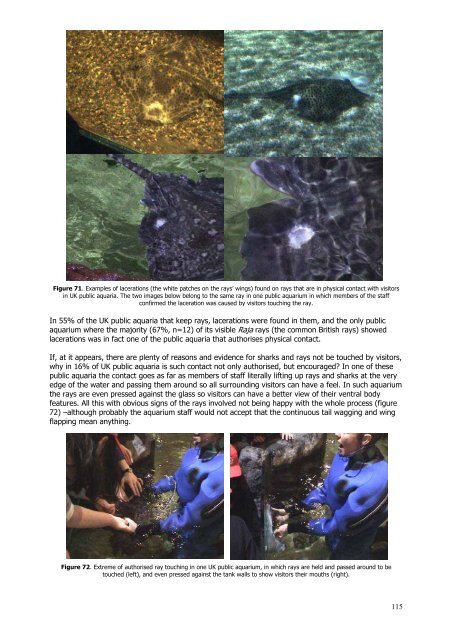Aquatic Zoos - Captive Animals Protection Society
Aquatic Zoos - Captive Animals Protection Society
Aquatic Zoos - Captive Animals Protection Society
Create successful ePaper yourself
Turn your PDF publications into a flip-book with our unique Google optimized e-Paper software.
Figure 71. Examples of lacerations (the white patches on the rays’ wings) found on rays that are in physical contact with visitors<br />
in UK public aquaria. The two images below belong to the same ray in one public aquarium in which members of the staff<br />
confirmed the laceration was caused by visitors touching the ray.<br />
In 55% of the UK public aquaria that keep rays, lacerations were found in them, and the only public<br />
aquarium where the majority (67%, n=12) of its visible Raja rays (the common British rays) showed<br />
lacerations was in fact one of the public aquaria that authorises physical contact.<br />
If, at it appears, there are plenty of reasons and evidence for sharks and rays not be touched by visitors,<br />
why in 16% of UK public aquaria is such contact not only authorised, but encouraged? In one of these<br />
public aquaria the contact goes as far as members of staff literally lifting up rays and sharks at the very<br />
edge of the water and passing them around so all surrounding visitors can have a feel. In such aquarium<br />
the rays are even pressed against the glass so visitors can have a better view of their ventral body<br />
features. All this with obvious signs of the rays involved not being happy with the whole process (figure<br />
72) –although probably the aquarium staff would not accept that the continuous tail wagging and wing<br />
flapping mean anything.<br />
Figure 72. Extreme of authorised ray touching in one UK public aquarium, in which rays are held and passed around to be<br />
touched (left), and even pressed against the tank walls to show visitors their mouths (right).<br />
115



